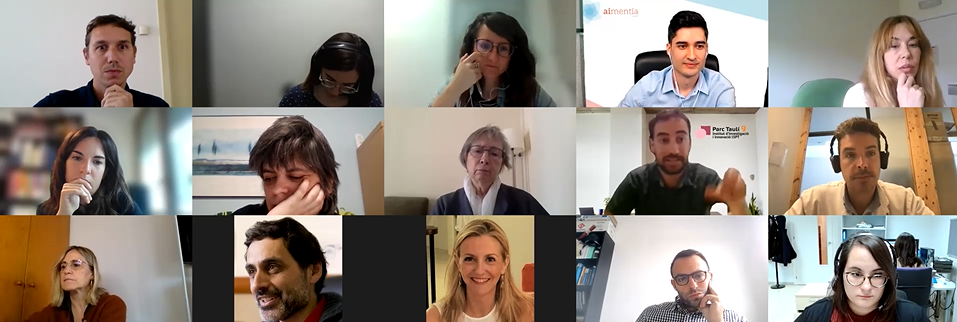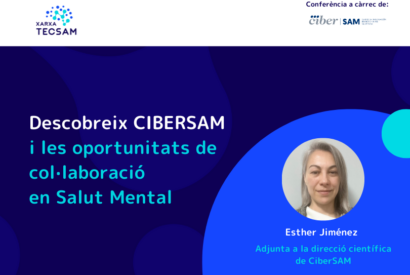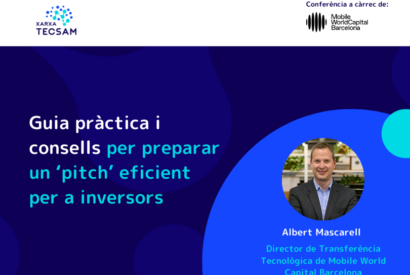Funding opportunities, key to launching public-private projects
Experts from the world of mental health research have shared their experiences participating in collaborative projects with startups in the VII Breakfast & Learn of the TECSAM Network. Did you miss it? You can watch it on Vimeo!

The mental health research environment finds in the private sector, especially startups, a way to meet needs or better solve common problems through new technologies. Despite the connection points that can be established in the form of collaborations between research and business, bringing this technology to the end user is not always easy. In the round table “Collaborative projects between research groups and startups”, held on Wednesday, May 4, some of the challenges and opportunities the scientists and businessmen face when starting joint projects have been addressed.
According to Maite Garolera, IP of the Brain Group, Cognition and Behavior group of the Terrassa Health Consortium, “It’s a great moment for clinicians and research to carry out technology projects… There’s a lot of offer, more offer than ever before”; this is an offer linked “directly or indirectly to the Next Generation aids”, with which “a much larger fork of projects and opportunities have been opened”. It is in this line that the “Nutescoti” project come out, which analyzes the symptoms of persistent COVID-19, developed in collaboration with Ignasi Capella, CMO at Broomx.
Despite this optimistic perspective, Garolera has also pointed out that the current public procurement system of technological services often constitutes a brake on the application of these technological solutions by the private sector, as it does not contemplate other forms of acquisition of services that are not the traditional ones.
In this sense, the participants of the session agreed to point out the need for the Administration to create a model for incorporating innovative technology into public health, following models such as those of Belgium and Germany, where the governments have already launched the direct purchase of technological services, facilitating projects to reach the end user as services.
Technology makes its way into institutional strategy
This round table, which forms part of the VII Breakfast&Learn, has also had the experience of Eduard Soler, head of the Innovation Unit of the Parc Taulí Research and Innovation Institute, who pointed out that althout there is a certain mismatch between the evolution of knowledge and the ability to integrate these new technological realities, he sees in these collaborative projects a dynamizing way.
Thus, he called on mental health research groups and companies to “continue to carry out competitive projects, continue to generate scientific evidence and a culture of change in organizations”. In fact, he points out that the innovative public procurement system, whose bases were created in 2009 by the Administration, has the objective of promoting business innovation and is an attempt to align the institutional strategy with the current technological reality.
On the other hand, Ignasi Capellà also considers that one of the main challenges for startups when it comes to promoting projects are institutional barriers, he considers that the 4 years, which is the average time it takes for an innovative technological project to be incorporated into the Government’s services portfolio, sometimes makes it difficult for startups to get ahead.
Although the homologation and purchase process is, in some cases, slow and hard, Eduard points out that TIC Salut has launched a digital project homologation program, which he considers to be the first step before these projects can enter into the service portfolio. In the same line, Garolera agrees that there is a real attempt from TIC Salut to make the homologation and purchase processes a reality, and gives the mConnecta project as an example.
Tools to facilitate contact between research and startups
On the other hand, Edgar Jorba, co-founder & CEO at Aimentia, who collaborates with different research groups of the Parc Sanitari Sant Joan de Déu and the Sant Joan de Déu Hospital to bring artificial intelligence in the field of mental health, agrees that the main obstacle is not finding points in common between them to materialize these public-private collaborations, but rather in the way in which the contracts to do so are typified today. “The contracts are not personalized for this type of project with a more technological nature,” he asserts.
One of these groups with which Aimentia works side by side is the Palliative Care and Complex Chronic Patient Service at the Sant Joan de Déu Hospital. Daniel Toro, a psychologist specialized in pediatric palliative care at the hospital, explains that the first contact with Aimentia was made through social networks, but he emphasizes the importance of knowing the ecosystem and the need to have tools to create synergies between the world of research and business.
On the other hand, Ignasi considers that there is a certain dispersion of knowledge, which makes difficult to undertake joint projects because it is not well known what tools are available on the market. In his opinion, he claims “the need to unify directories, databases and knowledge about research groups, hospitals, etc.
This is the reason why TECSAM Network was created, whose objective is to facilitate the mapping of the ecosystem and generate synergies and beneficial connections between companies/startups and hospitals/research groups to encourage the creation of collaborative projects that bring research results and knowledge to the market in the form of innovative solutions.
Funding, another challenge for collaborations
Another challenge faced by public-private partnerships is the sources of funding, often insufficient to set up innovative projects that require cutting-edge technology. In the case of startups, Ignasi states that private investors have to be often approached, as the public offer is not too large. In this respect, and from the other side of the spectrum, Maite recognises that in some cases research groups must adapt their projects to fit into the available funding loopholes.
During this table, the speakers have been able to expand on the joint projects they are leading and have been able to discuss the advantages, best practices and other challenges involved in carrying out such collaborations in the mental health sector. The meeting was held in virtual format. You can see the session deferred here and is possible to consult the schedule of the day in the following link.

